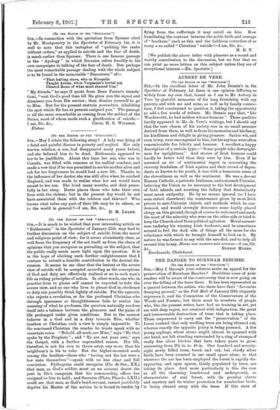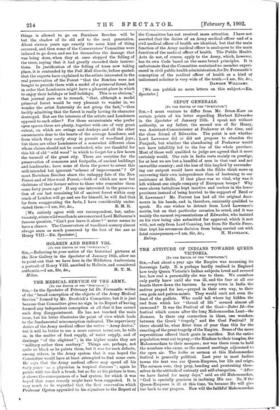THE DANGER TO BURNHAM BEECHES.
[To THZ EDITOR OF THE " SPATTAT01.1 ,SIR.,—May I through your columns,make an appeal for the preservation of Burnham Beeches ? Doubtless some of your readers will be aware of the controversy that is now going on over the felling of the trees there. It has been represented as a quarrel between the artists who there have their "favourite dumping ground," as the Pall Mall of January 29th elegantly expresses it, and the Committee of the Conservators of the Woods and Forests ; but there must be numbers of people who, like the present writer, have had no training in art, yet see with deep regret, not unmixed with indignation, the great and irrecoverable destruction of trees that is taking place. Those empowered to carry out the " preservation " of the forest contend that only seedling trees are being thinned out, whereas exactly the opposite policy is being pursued. A few young saplings, whose stems might almost be spanned with one hand, are left standing surrounded by a ring of stumps of really fine silver birches that have taken years to grow, measuring from 28i in. to 40 in. One hundred and seventy- eight newly felled trees, beech and oak, but chiefly silver birch, have been counted in one small space alone, so that wherever the axe has been employed the forest is rapidly dis- appearing, and open spaces, thinly populated by trees, are taking its place. And more particularly is this the case as all the charming brushwood and undergrowth, so characteristic of real forest, with its peculiar charm and mystery and its winter protection for numberless birds, is being cleared away with the trees. If this state of things is allowed to go on Burnham Beeches will be but the shadow of its old self to the next generation. About sixteen years ago exactly the same kind of thing occurred, and then some of the Conservators' Committee were induced to go down and see for themselves the damage that was being done, when they at once stopped the felling of the trees, saying that it had greatly exceeded their instruc- tions. In justification of the felling of trees now taking place, it is contended by the Pall Mall Gazette, before quoted, that the experts have explained to the artists interested in the real preservation of the Forest "that the Beeches were not bought to provide them with a model of a primeval forest, but in order that Londoners might have a pleasant place in which to enjoy their holidays or half-holidays. This is so obvious," that journal goes on to remark, "that, although a model primeval forest would be very pleasant to wander in, we wonder the artist fraternity do not grasp the faot,"—thus tacitly admitting that the forest is really having its character destroyed. But are the interests of the artists and Londoners opposed to each other ? For those excursionists who prefer open spaces there are plenty, together with one of very great extent, on which are swings and donkeys and all the other amusements dear to the hearts of the average Londoner, and from which they rarely stray in pursuit of woodland joys ; but there are other Londoners of a somewhat different class whose claims should not be overlooked, who are thankful for this bit of old "wild wood" in which to forget for a few hours the turmoil of the great city. There are societies for the preservation of commons and footpaths, of ancient buildings and landmarks ; have none of them the power to arrest this well-intended but ignorant "scheme of improvement" ? Or must Burnham Beeches share the unhappy fate of the New Forest and of Sherwood Forest,—both of which are now but skeletons of their former selves to those who remember them some forty years ago ? If any one interested in the preserva- tion of our last remaining bit of ancient forest within easy reach of London will go and see for himself, he will find that far from exaggerating the facts, I have considerably under- [We entirely agree with our correspondent, but, unfor- tunately, where wild woodlands are concerned Lord Melbourne's famous question, "Can't you leave it alone ? " never seems to have a chance. The Conservators of woodland scenery almost always seem as much possessed by the lust of the axe as Henry VIII.—ED. Spectator.]











































 Previous page
Previous page